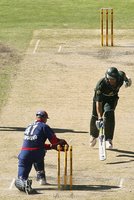There have been two of these run outs in recent matches. On Australia Day, Gilchrist was looking for a quick single, but his team-mate (Hayden) was not. Gilchrist made it halfway down the pitch (and almost all the way back) before the stumps were broken. It was slightly embarrasing, but not a patch on what had occured 7 days prior.
 In the previous Australia-England match, Ian Bell and Paul Collingwood were batting, when Bell hit the ball to the left of Cameron White. White dived, knocked the ball down, and went to retreive the ricochet.
In the previous Australia-England match, Ian Bell and Paul Collingwood were batting, when Bell hit the ball to the left of Cameron White. White dived, knocked the ball down, and went to retreive the ricochet.What happened next included three of the classic elements of an embarrasing run out. Both batsmen at the one end of the pitch - confusion and panic between batsmen - and both batsmen running towards one end.
It would be stating the obvious to say that this was poor communication between the two players, but something not so obvious showed up in the replays. (Sidenote - for some reason, the more comical the run out, the more tv replays it receives.)
As Bell was changing his mind between 'run' and 'don't run' (i counted about seven changes of mind on the slo-mo replay) there didn't seem to be any glances in the direction of his team-mate - until it was all too late.
Granted, it's important to see what the fielder might do, but in a team game it's about teamwork. It doesn't matter if you think there's an easy run if your partner remains firmly planted at the other end. Team-mates should be on the same page, on the same wavelength, but not at the same end of the pitch.
So it is in life. We are involved in many 'partnerships'. Be it marriage, friendships, a relationship, or at work. Things work best when people communicate, and are clear on what they want to do. As is the case in experienced batting partnerships (eg. Langer and Hayden, Hussey and Clarke) this clarity brings about plenty of success, and very few embarrasing stuff ups.
People who tend to pray often say the same sort of thing. Even if they have nothing 'specific' to pray about, they still have conversations with God. When faced with decisions and wondering "what would God think about this?", it's the experience of talking with God on a regular basis that they say helps in making the tough decisions. (In the same way that it would help Ian Bell if he occasionally looked at his team-mate).
I guess this makes a lot of sense. If God is the ultimate batting partner (to continue the analogy) then it would be quite a smart move to do everything one can to be on the same wavelength.
